
It’s been wonderful this spring, being a part of all the vendor briefings now in high gear. That’s because in short but sometimes painfully dense bursts, we get to know what each vendor has in store for the months ahead. It’s a lot and that’s a good sign. There seems to be a breakout happening.
One of the themes running through all the events — like a kid on a tricycle — is marketing. Everywhere you look, marketing is making noise.
Oracle completed the acquisition of Eloqua, Marketo filed for an IPO, Salesforce is putting significant resources behind its Marketing Cloud and, most importantly, marketers are in the ascent.
SiriusDecisions, an analyst firm, is holding a conclave this week in which it is discussing its new marketing waterfall methodology. Marketers as well as associated vendors like Lattice-Engines and Full Circle CRM, just to pick two, are sending contingents to the event to see and be seen, and to soak up the new marketing vibe.
Closer to home, I am attending HubSpot’s second (?) annual analyst day at its Cambridge offices. HubSpot became an early darling of the new marketing movement a few years ago when it turned marketing on its head and said, “No, no, no, try this.” That turned into inbound marketing, and it was very successful.
Marketing Up, Recession Down
Generally, when marketing kicks it up a notch, as it is doing now, there are a couple of economic possibilities. Either we’re entering a new market/category/paradigm, or the economy is showing signs of life after a recession. I think it’s possible both are happening right now. The recession is slowly ending, and marketing as a discipline is the new paradigm.
In fact — and this is most interesting — the marketing upsurge started at the depths of the recession when austerity was big news and almost nothing was getting traction. But it was almost as if the crowd said, “No, we don’t buy it, let’s get the economy moving again. Let’s go on offense, let’s start marketing and selling again and we’ll spend some money to make it happen.”
Here’s where economics imitates life.
A couple of weeks ago, the economic ideas underpinning the austerity argument — which has devastated Europe and made the sequester in D.C. a bad word — fell apart. Two Harvard economists named Reinhart and Rogoff, whose work had led the austerity charge, were proved to have made significant spreadsheet errors.
If there was an Oopsie Award, they’d win it this year for sure.
The translation is that the Austerians (as Paul Krugman likes to call them) got it wrong. There were math errors and erroneous assumptions in the Reinhart-Rogoff model and the data did not support their conclusions. Overnight, austerity — if not stinking like a dead fish — is at least sitting in the sun and beginning to decompose.
What’s interesting to me is that the general marketplace began reacting long before the fall of the Reinhart-Rogoff model. No one needed to be hit over the head with an old tire tool to change directions. We’re anything but doctrinaire in this country, and when something doesn’t work we make little adjustments, regardless of what officials and supposedly smart people tell us.
That’s the beauty of our free market system. It’s distributed and as non-hierarchical as you can get, and it works beautifully in a pinch.
Democracy, Capitalism and CRM
In my own mind, I often compare democratic capitalism practices in the West with totalitarian capitalism practiced across the Pacific. The Chinese have a great ability to marshal their people and resources to output great quantities of goods, but they still operate in a hierarchical command and control manner.
Democracy and totalitarianism are political systems, just as capitalism is an economic one. Politics and economics have to operate together. You need both.
I could never fathom how totalitarian capitalism could orchestrate the changes I’ve seen this spring. The very idea of individuals deciding for themselves what to do in a confusing market with a totalitarian political system — even with free market capitalism as the economic model — and breaking away from official thinking is hard to imagine.
To me that’s part of what CRM captures. It’s the chaotic and the spontaneous on which CRM tries to ride herd. Sometimes it works well and at other times it can fail. But CRM has made important leaps forward. Like economics, sociology or any of the soft sciences, it has come into its own as it has adopted many of the tools of soft science — the bell curve, crowdsourcing, Big Data, analysis and, most of all, probability.
There’s just no way a political-economic system other than what we have in the West could come to the same conclusion. It would be like asking a fish to invent fire.
























































Thanks for providing this interesting analysis and analogy, Denis! It’s true social CRM isn’t a perfect software designed to solve all of a businesses problems, but it provides/organizes the unique data into manageable and translatable sections. Furthermore, the evolution of SCRM software is only going to continue just like humans, economics, and so on. Also, the affordability, accessibility, and security of cloud-based office suites offering SCRM, like GreenRope, are more reliable than ever before. I hope to see what the future has in store for SCRM software, and I AM deeply interested to see how it will adjust to upcoming domestic/international market trends.